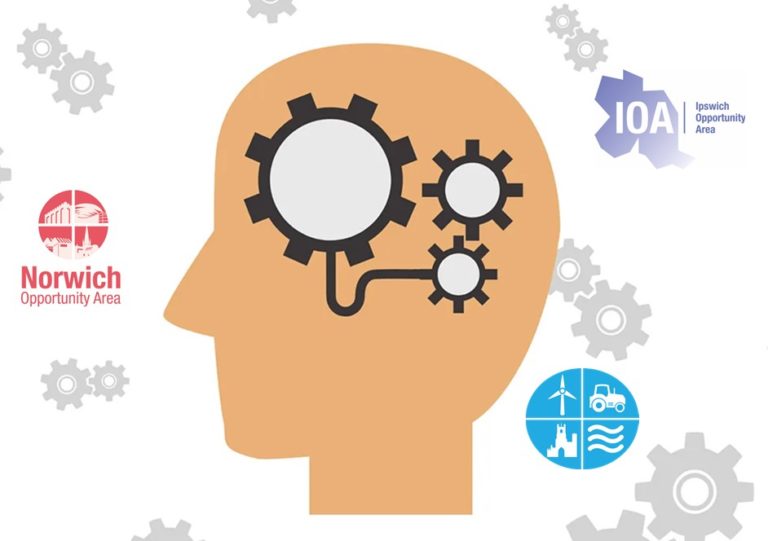Set the foundations for good implementation in school before you attempt a new approach. Enablers of successful participation included flexibility, adaptability, and leadership engagement. Support for collaboration improves experiences and supports sustainability.
#334
Evidence Based Practice
A series of school-based projects to implement evidence based approaches, supported by local Research Schools: Norwich Research School, Unity Research School, Ipswich Associate Research School, the Norwich Research Lead Network and the Ipswich Research Schools Network.
Audience
Head Teachers / School Leaders, Local Authorities, School Teachers, Settings & Early Years Practitioners, TrustsAimed at
Early Years Foundation Stage, KS1, KS2, KS3, KS4, KS5Outcome
Inclusion and SEND, Literacy, Numeracy, Raising Attainment, Workforce: Recruitment, Retention and DevelopmentApproach
CPDWhy was the project needed?
Although Ipswich (IOA), Norwich (NOA) and Fenland and East Cambridgeshire (FOA) Opportunity Areas have broad priorities for improvements, there isn’t always a “one size fits all” approach that’s appropriate; schools, colleges and early years settings in all the Opportunity Areas (OAs) were keen to implement a broad range of evidence based approaches to improve outcomes.
What happened and what was the impact?
Schools, colleges and early years settings in Ipswich and Norwich were funded to implement evidence based approaches to key priorities for their OA. Applications could be for projects up to £25,000 with a secure evidence base. Local Research Schools supported schools with insight into evidence based approaches, the application process and training on implementation. 28 such projects were funded in Ipswich, and 34 in Norwich with a total investment across the 2 areas of £1m.
Participating schools were first supported to identify an area of development where a fresh approach was needed, and they received support from their local Research School to identify “best bets” from the research evidence. Many schools used the Education Endowment Fund (EEF) toolkit, but not exclusively.
Several schools took part in training to support their planning, implementation and evaluation. Schools then submitted an application form to the appropriate OA. Successful bids were awarded grants, payable in 3 instalments in response to interim and final reports.
Most EBPF projects focused on literacy and targeted disadvantaged pupils. Motivations to apply centred around specific identified learning needs and made use of existing evidence in deciding on projects. The EEF toolkit was used to look for interventions that addressed a specific learning need.
See the links to case studies on this page for some great examples of the individual projects, how they were implemented and evaluated, and what their outcomes were.
What did and didn't work?
Overall participation in the Evidence Based Practice project was seen as positive and perceived positive outcomes were systemic. The EEF resources were very helpful along with having a supportive network to share challenges and findings, the Norfolk Research Lead Network is a great example.
An independent evaluation conducted by Cambridge University highlighted the challenge schools find in implementation and evaluation, something already noted by the EEF. Key learning is that training in implementation and evaluation (see link to EFF evaluation resources in Big Idea resources section), careful planning and capacity for staff to implement and monitor is critical to the success of new approaches to improve outcomes in schools.
Training or a refresher in implementation and evaluation is key to embedding a new approach, however many years you’ve been in education!
Implementation of evidence based practice projects was rewarding, but often unexpectedly challenging and engagement with research schools during implementation varied. Senior leadership engagement was high and most projects were collaborative in nature. Cross-school collaboration was useful but not promoted by programme structures.
How did you measure success?
Many evidence based practice projects employed robust evaluation designs with raw rich data being collected and analysed, though some evaluations were overly ambitious. EEF evaluation guidance was useful and could be further developed to link with school circumstances, but methodological challenges remained.
Individual schools, colleges and settings reported a range of impacts depending on the outcomes that they were targeting in their projects, and these can be seen in the individual case studies. Overall, the OAs were interested in the impact that this Big Idea had on schools’ confidence in finding and using evidence based approaches and in implementing and evaluating their impact.
Statistics taken from a survey of Norwich schools in June 2019 showed that 47% of Headteachers said their decision making at Senior Leadership Team level was more evidence informed than a year ago and 52% said classroom practice was more evidence informed than a year ago.
By March 2021 76% of Ipswich schools reported that their senior leadership team decision making had become more evidence led, and that 84% of teaching and learning had become more research evidence based over the preceding two years.
Outcomes varied project by project, but the experiences, research findings and approaches have influenced many schools’ confidence to find, implement and evaluate evidence-based approaches.
Wisdom
Ingredients For Success
Is the Project Complete or Ongoing
The Evidence Based Practice project is now complete.
How is the Project Sustainable
Norwich Research School have been a key partner in the roll out of the Evidence Based Practice Fund in Norwich and the Norfolk Research Lead Network is a flourishing community of practitioners, many of whom benefitted from the project funding as part of their journey. The same is true of the Unity Research School/Ipswich Associate Research School and the Ipswich Research Schools Network in Ipswich.
What are the Long Term Impacts
With so many different individual projects being undertaken by schools across the OAs, it is difficult to comment in general on the long-term impact of the overall project but we are hopeful that many of the projects will result in lasting changes and have created an on-going culture of practice that is supported by an evidence base. We also hope that schools now have a greater awareness of how to approach, plan, implement and evaluate future evidence-based projects.
Estimated Costs
The OAs made a total investment of £1m in 62 projects across Ipswich and Norwich.
It has given us the opportunity to upskill all our staff which in turn enables the progress and raised attainment of our pupils. We have been able to enhance our curriculum resources, strengthen our partnership with parents and have a positive impact on more children reading for pleasure.
The biggest success of the Evidence Based Practice Fund, it’s been a change in thinking and attitude [in school leadership teams] as much as it is about the individual projects themselves. […] it’s proving the worth of evidence-informed research and practice, whether the individual project has borne fruit or not.
The high quality of the evaluation approaches proposed by schools in their respective EBPF projects is testament to the support received from Research Schools, and the signposting to resources such as the EEF (self-) evaluation toolkit. The proposed evaluation designs are, on the whole, robust, and use a variety of data sources.
Our evidence … suggests that the Research Schools can, and in many cases do, play a significant mediating role to support bridging this knowledge gap. They can, and do, provide the scaffolding that schools need to successfully implement (including to evaluate) their EBPF projects.
A further useful support mechanism on behalf of the Research Schools, and the EBPF programme framework as a whole, is the freedom for schools to recognize the importance of their own contexts in implementing their respective EBPF projects. This may be in relation to the choice of intervention; or the evaluation design deployed. In both these cases, schools appreciate the acknowledgement that evidence-in-context is important.
Feedback on the Evidence Based Practice project.Area Most Impacted
Inclusion
Improving Attainment
Speech
Language & Communication
Transition
Next steps to do something similar yourself
These are a list of Big Idea resources that you can use to implement in your setting:
For guidance on planning your evaluation take a look at the EEF guidance and resources page:
The EEF website also has teaching and learning and early years toolkits that can help you identify some of the “best bets” when looking for new approaches:
The planning documents that we use in the Norwich and Ipswich Opportunity Areas are here:
Read Cambridge University's Evaluation of EBP projects here:
Read the EEF Guidance Report on Putting Evidence to Work here
Read the EEF Guidance Report on Metacognition and Self-Regulated Learning here
See the full range of guidance reports available from EEF here
Champions and contacts
Authors
Hub Contact Details



If you've got any thoughts and ideas of how this approach could be improved or an positive impact it's had for you, add them below
Login or register now to post any comments